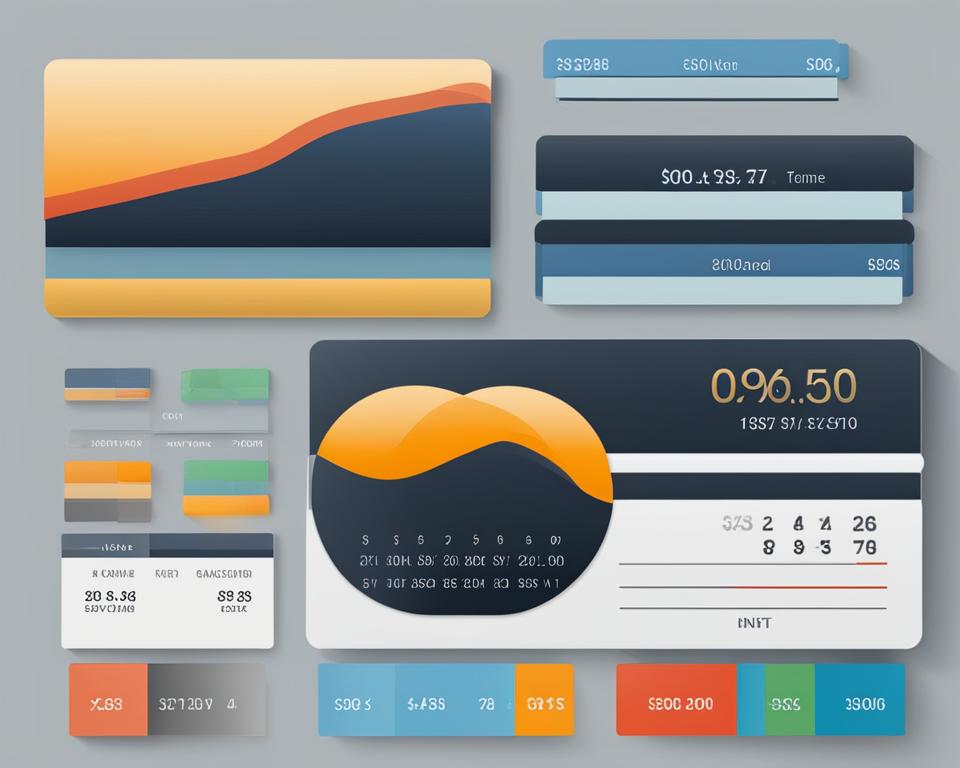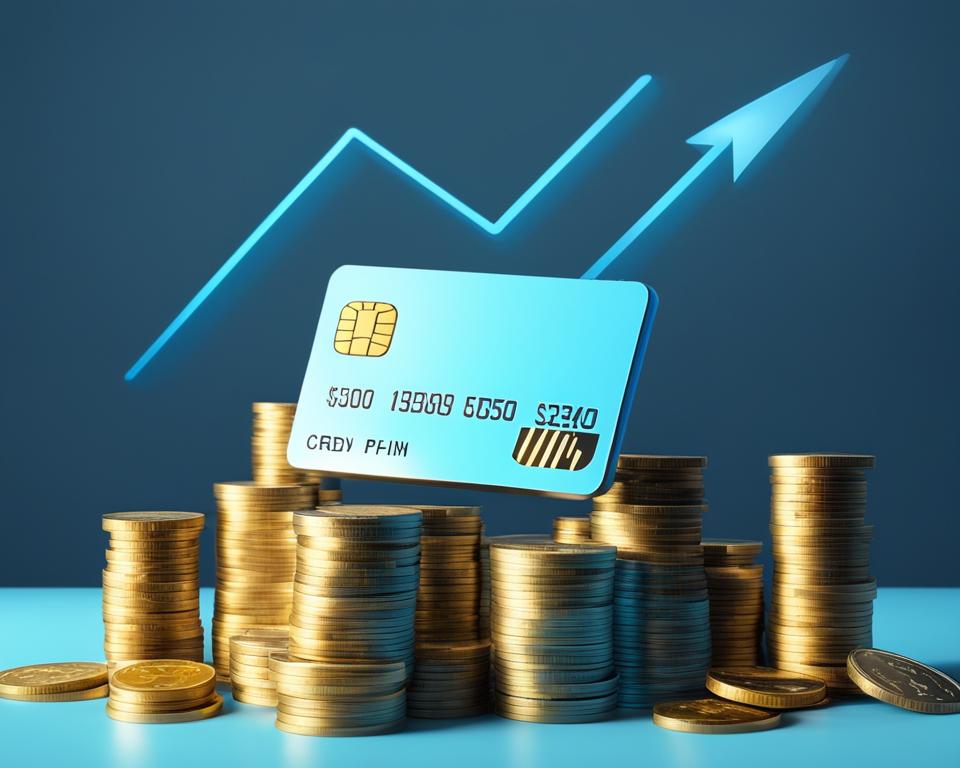Credit card interest is an important aspect of managing your finances and avoiding unnecessary debt. Whether you’re new to credit cards or a seasoned user, it’s crucial to understand how credit card interest works to make informed decisions about your spending and repayment strategies.
Credit card interest is the fee charged by credit card companies for borrowing money. It is typically expressed as an annual percentage rate (APR) and can vary depending on factors such as the type of card and the borrower’s credit score. The interest is calculated based on the outstanding balance and added to your balance daily, if you carry a balance.
To understand how credit card interest is calculated, it’s important to know the basics. The APR is divided by the number of days in a year to determine the daily interest rate. This daily interest charge is then added to your balance, increasing the amount you owe. If you continue to carry a balance without paying it off, the interest charges can accumulate quickly and make it difficult to pay off your debt.
By understanding how credit card interest works, you can make more informed decisions about your spending and repayment strategies. This knowledge can help you avoid unnecessary debt and financial stress.
Key Takeaways:
- Understanding how credit card interest works is crucial for managing your finances and avoiding unnecessary debt.
- Credit card interest is the fee charged by credit card companies for borrowing money.
- The interest is calculated based on the outstanding balance and added to your balance daily, if you carry a balance.
- By understanding how credit card interest is calculated, you can make more informed decisions about your spending and repayment strategies.
- Managing your credit card debt effectively can help you avoid excessive interest charges and ensure your financial well-being.
What Is Credit Card Interest?
Credit card interest is the cost of borrowing money from a credit card company. It is usually expressed as an annual percentage rate (APR) and can vary depending on factors such as the prime rate and the borrower’s credit score. Most credit cards have variable APRs that can change over time.
It’s important to note that credit card interest is only charged if you carry a balance on your card and do not pay it off in full each month.
| Credit Card Interest | Explanation |
|---|---|
| Cost of Borrowing | Credit card interest is the fee charged by credit card companies for the privilege of borrowing money. |
| Annual Percentage Rate (APR) | The APR represents the annualized cost of borrowing expressed as a percentage. It includes both the interest rate and any additional fees. |
| Variable APR | Many credit cards have variable APRs, which means that the interest rate can change over time based on market conditions or the credit card issuer’s discretion. |
| Credit Score Importance | Your credit score plays a significant role in determining the interest rate you’ll be charged. Higher credit scores often result in lower interest rates. |
| Carrying a Balance | Credit card interest is only applicable if you carry a balance on your card. Paying off the full balance each month can help you avoid interest charges. |
Understanding credit card interest rates and how they work is essential for making informed financial decisions. By staying aware of your credit card terms, paying off your balance on time, and managing your debt responsibly, you can navigate the world of credit cards more effectively and avoid unnecessary interest charges.
How Credit Card Interest Works
If you carry a balance on your credit card, the card company will calculate and add interest to your outstanding balance each day. The daily interest rate is determined by dividing the card’s APR by the number of days in a year. This daily interest charge is then added to your balance, increasing the amount you owe. If you continue to carry a balance without paying it off, the interest charges can accumulate quickly and make it difficult to pay off your debt.
Understanding Credit Card Finance Charges
Credit card finance charges refer to the fees and interest that credit card companies impose on cardholders for carrying a balance. These charges can significantly increase the amount you owe and make it challenging to manage your credit card debt effectively. By understanding how credit card interest works, you can make informed decisions to minimize finance charges and take control of your financial situation.
“If you carry a balance without paying it off, the interest charges can accumulate quickly and make it difficult to pay off your debt.”
| Managing Credit Card Debt | Tips |
|---|---|
| Create a budget | Make a detailed budget to keep track of your expenses and allocate funds towards paying off your credit card debt. |
| Pay more than the minimum | Avoid paying only the minimum payment as it prolongs the repayment period and increases the total interest charges. |
| Consider balance transfers | Explore the option of transferring your credit card balance to a card with a lower interest rate to save on finance charges. |
| Communicate with your credit card company | If you’re facing financial difficulties, reach out to your credit card company to discuss potential solutions such as payment plans or hardship programs. |

By actively managing your credit card debt and being mindful of finance charges, you can take steps towards financial stability and avoid the burden of excessive interest. It is important to prioritize paying off your balance and explore strategies that work best for your individual circumstances.
What Is a Good Interest Rate for a Credit Card?
Credit card interest rates can vary widely depending on the credit card issuer and the borrower’s credit score. Generally, the better your credit score, the lower the interest rate you may qualify for. It’s important to shop around and compare credit card offers to find the best interest rate for your financial situation.
When it comes to credit cards, the interest rate, also known as the annual percentage rate (APR), plays a significant role in determining the cost of borrowing money. A lower interest rate means you’ll pay less in interest charges over time, making it easier to manage your credit card debt and save money.
So what is considered a good interest rate for a credit card? Well, it depends on various factors, including your creditworthiness, the type of card you’re applying for, and market conditions. Generally, a good interest rate for a credit card is typically in the range of 10% to 15% APR.
Factors that Determine Credit Card Interest Rates:
- Credit Score: Your credit score is a major factor in determining the interest rate you’ll be offered. Lenders view borrowers with higher credit scores as less of a risk, so they may offer lower interest rates.
- Card Type: Different types of credit cards have varying interest rates. For example, rewards cards or premium cards may have higher interest rates, but they may also come with additional perks and benefits.
- Market Conditions: Interest rates can fluctuate based on market conditions, including changes in the economy and financial industry trends.
- Introductory Offers: Some credit cards may offer introductory 0% APR promotions for a certain period. This can be a great way to save on interest charges, but it’s important to be aware of the regular APR that will apply after the promotional period ends.
- Payment History: Your payment history with other creditors can also impact the interest rate you’ll be offered. Lenders want to see a consistent track record of on-time payments.
It’s worth noting that the specific interest rate you’ll be offered will depend on your unique financial circumstances. To find the best interest rate for your needs, compare credit card offers, consider your credit score, and read the fine print to fully understand the terms and conditions.
| Credit Card Issuer | Average APR Range |
|---|---|
| Chase | 14.99% – 23.74% |
| Bank of America | 12.99% – 22.99% |
| Citibank | 14.74% – 24.74% |
| American Express | 12.99% – 22.99% |
Note: The above table provides a general range of average credit card APRs for some popular issuers. Actual rates may vary and are subject to change.
When comparing interest rates, it’s also essential to consider the other features and benefits of a credit card. Rewards programs, annual fees, introductory offers, and customer service are important factors to keep in mind when choosing the right credit card for your financial goals.
By understanding credit card interest rates and considering your creditworthiness, you can make an informed decision when selecting a credit card and potentially save money on interest charges in the long run.
Repaying Credit Card Debt: 2 Interest Scenarios
When it comes to repaying credit card debt, understanding the impact of interest charges is crucial. Two common scenarios to consider are paying only the minimum payment and paying more than the minimum. Each option has its implications and can significantly affect the time it takes to pay off the debt and the total interest paid.
Paying the Minimum Payment
Choosing to pay only the minimum payment can have long-term consequences. While it may seem like an attractive option due to its lower immediate cost, it can extend the repayment timeline significantly. By making only the minimum payment, a larger portion of each payment goes towards interest rather than reducing the principal balance. This lengthens the time it takes to pay off the debt and results in higher overall interest charges.
For example, let’s say John has a credit card balance of $5,000 with an APR of 18%. If he chooses to pay only the minimum amount (typically around 2% of the balance or $25, whichever is higher), it could take him more than 20 years to pay off the debt, and he could end up paying over $8,000 in interest.
Paying More than the Minimum
Paying more than the minimum payment can help expedite the debt repayment process and reduce the total interest paid. By allocating extra funds towards the principal balance, borrowers can chip away at their debt more quickly. This approach not only reduces the outstanding balance but also lowers the interest charges applied to the remaining debt.
Continuing with the previous example of John’s $5,000 credit card balance with an 18% APR, let’s assume he decides to pay $100 instead of the minimum payment. By doing so, he can pay off the debt in approximately 6 years and save over $5,000 in interest charges.
| Minimum Payment | $100 Payment | |
|---|---|---|
| Time to Pay Off | Over 20 years | Approximately 6 years |
| Total Interest Paid | Over $8,000 | Approximately $3,000 |
As demonstrated in the table above, paying more than the minimum can have a significant impact on debt repayment. Not only does it reduce the time it takes to become debt-free, but it also saves a substantial amount in interest charges. It’s important to regularly assess your financial situation and consider allocating extra funds towards paying off your credit card debt, whenever possible.
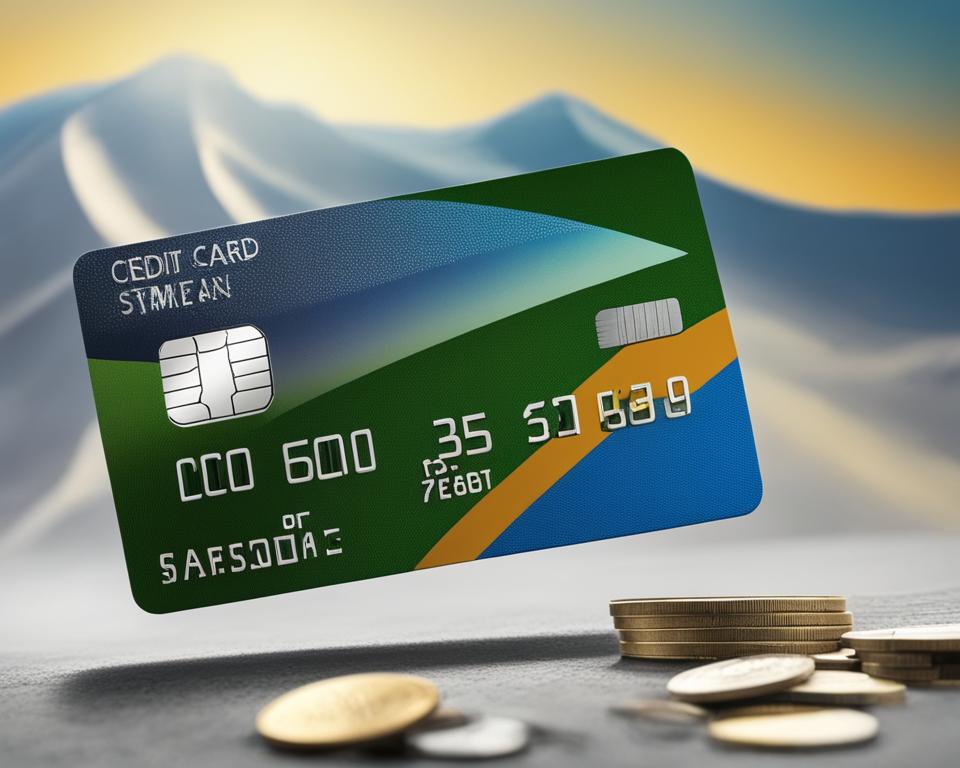
Why Pay Your Balance in Full?
When it comes to credit card usage, one of the most important strategies to save money on interest charges is to pay off your balance in full each month. By doing so, you can avoid the burden of credit card interest and keep more money in your pocket. Let’s explore why paying your balance in full is a smart financial move.
Avoiding Interest Charges
When you carry a balance on your credit card, the credit card company charges you interest based on the outstanding amount. This interest is added to your balance, increasing the total amount you owe. However, when you pay off your balance in full, you effectively eliminate the need to pay any interest. It’s like getting a guaranteed return on your investment because you don’t have to pay the additional cost of borrowing money.
Maximizing Your Savings Potential
Paying your credit card balance in full not only saves you money on interest charges, but it also frees up more cash for future investments. By avoiding credit card interest, you have more disposable income to put towards savings, investments, or other financial goals. This can help you build wealth and achieve your long-term objectives faster.
By paying off your credit card balance in full each month, you can break free from the cycle of debt and take control of your financial future. It’s a powerful strategy for improving your financial well-being and achieving financial freedom.
Building Good Credit
Consistently paying off your credit card balance in full demonstrates responsible credit management. It shows lenders and financial institutions that you are reliable and capable of managing your debts effectively. This responsible behavior can help you build a positive credit history, leading to better credit scores and improved access to credit in the future.
Financial Peace of Mind
Knowing that you have paid off your credit card balance in full each month provides a sense of financial security and peace of mind. Without the worry of accumulating interest charges, you can focus on using your credit cards strategically and responsibly. This sense of control over your finances can reduce stress and contribute to overall financial well-being.
In summary, paying off your credit card balance in full each month is a wise decision that can lead to significant savings. It allows you to avoid credit card interest charges, maximize your savings potential, and build good credit. With the financial freedom and peace of mind that comes with paying your balance in full, you can confidently manage your credit cards and achieve your financial goals.
How Much Is Interest on a Credit Card?
The interest charged on a credit card can vary depending on the credit card issuer and the borrower’s credit score. As of June 2023, the average APR for credit cards was 23.74%. It’s important to note that credit card interest is calculated based on the outstanding balance on the card and can fluctuate depending on the daily interest rate and the length of the billing cycle.
Understanding the interest rates associated with credit cards is crucial for managing your finances effectively. By being aware of the APR and how it is calculated, you can make informed decisions about your credit card usage and avoid unnecessary interest charges.
| Credit Card Issuer | Interest Rate Range |
|---|---|
| ABC Bank | 18.99% – 24.99% |
| XYZ Credit Union | 15.99% – 21.99% |
| 123 Financial | 19.99% – 27.99% |
“Understanding the interest rates associated with credit cards is crucial for managing your finances effectively.”
It’s worth noting that credit card interest rates can vary significantly among different card issuers. The range provided in the table is just a general overview and doesn’t cover all possible rates. Before applying for a credit card, it’s essential to compare offers from different issuers and carefully review the terms and conditions to determine the interest rate that applies to you.
By paying attention to credit card interest rates and staying informed about any changes that may occur, you can make smart financial decisions that help you avoid excessive interest charges and keep your finances on track.
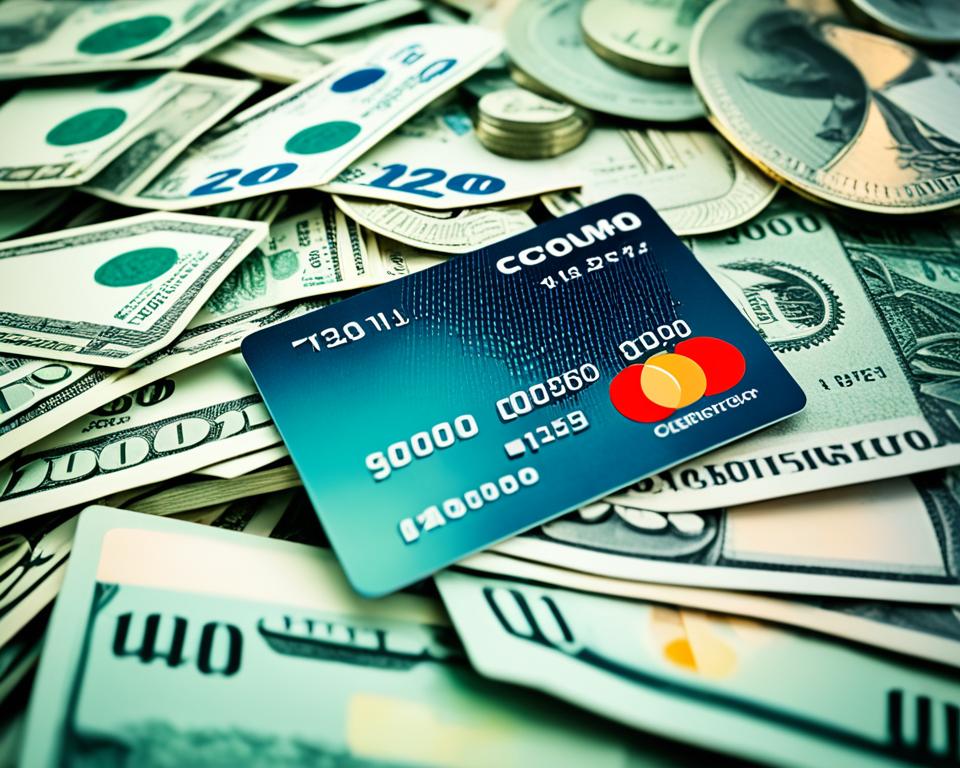
How Do You Avoid Paying Interest on a Credit Card?
Managing credit card debt effectively is crucial for financial stability and avoiding unnecessary interest charges. To avoid paying interest on a credit card, you need to take proactive steps and develop responsible financial habits.
The most effective way to avoid credit card interest is by paying off your balance in full each month. By doing so, you eliminate any carryover balance to the next billing cycle, preventing the credit card company from charging interest on that amount.
It’s essential to prioritize paying off your credit card balance and manage your finances effectively to avoid building up debt. By spending within your means and creating a budget, you can ensure that you have enough funds available to cover your monthly credit card expenses.
Additionally, consider setting up automatic payments for your credit card bill each month. This helps prevent any accidental late payments that could result in interest charges.
Remember that maintaining a good credit score is also vital for managing credit card debt. A high credit score can help you qualify for lower interest rates, reducing the amount of interest you would have to pay on any carried-over balance.
By paying off your balance in full each month, managing your finances responsibly, and maintaining a good credit score, you can effectively avoid paying interest on a credit card.
Do You Get Charged Interest on Your Card if You Pay the Minimum?
When it comes to credit card debt, paying the minimum payment may seem like a convenient option to keep your account in good standing. However, it’s important to understand that paying only the minimum does not exempt you from accruing interest on the remaining balance. Yes, you will still be charged interest on your credit card balance even if you meet the minimum payment requirement.
The minimum payment is the minimum amount you need to pay each month to avoid late fees and penalties. It is typically calculated as a percentage of your outstanding balance or a fixed amount, whichever is higher. While making the minimum payment ensures that you are not penalized for late payment, it does not prevent interest from accumulating on the unpaid balance.
By only paying the minimum, the remaining balance carries forward to the next billing cycle, and the credit card company continues to charge interest on that amount. This means that even if you consistently make the minimum payment, you will be subject to interest charges, and your debt can accumulate quickly over time. The longer you carry a balance and only make the minimum payment, the more interest you will ultimately pay.
It is essential to understand the financial implications of carrying credit card debt and the cost of minimum payments. While the minimum payment keeps your account in good standing, it is not an effective strategy for paying off your balance and avoiding excessive interest charges. If possible, it is advisable to pay more than the minimum each month to reduce your debt faster and minimize the interest you have to pay.
Proper financial management and budgeting are key to avoid accumulating more debt and to eliminate existing credit card balances promptly. By paying more than the minimum, you can take control of your finances and work towards becoming debt-free.
| Minimum Payment | Interest Charges |
|---|---|
| Payments only meeting the minimum requirement | Accumulation of unpaid balance and interest charges over time |
| Higher monthly payments above the minimum | Reduced outstanding balance and lower overall interest charges |
The Bottom Line
Credit card interest can be a significant financial burden if not managed properly. Paying off your credit card balance in full each month is the best way to avoid high interest charges and keep your finances under control. By understanding how credit card interest works and taking proactive steps to manage your debt, you can stay on top of your finances and avoid unnecessary expenses.
Proactive Steps to Managing Credit Card Debt
1. Budgeting: Create a budget that includes your credit card payments. Prioritize paying off your credit card balance to avoid accumulating interest charges and potential debt.
2. Paying on Time: Make your credit card payments on time to avoid late fees and penalty interest rates. Set up automatic payments or reminders to help you stay on track.
3. Monitoring Spending: Keep track of your credit card spending to ensure you stay within your budget. Avoid unnecessary purchases and consider using cash or debit cards for everyday expenses.
“Paying off your credit card balance in full each month is like getting a guaranteed return on your investment and can free up more money for future investments.”
4. Consolidating Debt: If you have multiple credit cards with high balances and interest rates, consider consolidating your debt into a single loan or transferring balances to a card with a lower interest rate. This can help simplify your payments and potentially save you money on interest charges.
Benefits of Managing Credit Card Debt
Effectively managing your credit card debt has several benefits:
- Save Money: By paying off your balance in full each month, you avoid paying unnecessary interest charges, allowing you to keep more of your hard-earned money.
- Improve Credit Score: Consistently paying off your credit card balance can positively impact your credit score and increase your chances of qualifying for lower interest rates in the future.
- Reduce Stress: Taking control of your finances and effectively managing your credit card debt can help reduce stress and provide peace of mind.
By following these proactive steps and understanding credit card interest, you can avoid falling into debt and maintain a healthy financial lifestyle.
| Without Proper Debt Management | With Proper Debt Management | |
|---|---|---|
| Total Interest Paid | $5,000 | $0 |
| Time to Pay off Debt | 10 years | 2 years |
| Credit Score Impact | Negative | Positive |
What is Purchase Interest Charge?
The purchase interest charge is an additional fee imposed by your credit card issuer when you carry a balance on your card and fail to pay off your statement balance in full by the end of the billing cycle. This charge is calculated based on your card’s annual percentage rate (APR) and the total outstanding balance on the card. It specifically applies to purchases made during the billing cycle.
When you make purchases using your credit card, the issuer provides a grace period during which you can pay off the entire statement balance without incurring any interest charges. However, if you carry a balance beyond this grace period, the purchase interest charge comes into play. This charge is added to the balance you owe, making it important to manage your credit card debt effectively.
“If you carry a balance on your credit card, it’s crucial to be aware of the purchase interest charge. By understanding how it’s calculated and taking steps to pay off your balance, you can avoid unnecessary expenses and minimize your debt.”
The purchase interest charge is calculated based on the annual percentage rate (APR) of your credit card. The APR represents the cost of borrowing money and varies from card to card. It’s essential to review your credit card agreement or contact your card issuer directly to determine the specific interest rate associated with your card.
Let’s take a closer look at an example to understand how the purchase interest charge is calculated. Suppose you have a credit card with an APR of 18% and an outstanding balance of $1,000. If you carry this balance over to the next billing cycle without paying it off, the purchase interest charge for that cycle would be:
Interest Charge = (Outstanding Balance) x (APR) x (Number of Days in Billing Cycle / Number of Days in a Year)
Based on a billing cycle of 30 days and a 365-day year, the calculation would be:
Interest Charge = $1,000 x (18% / 365) x (30 / 365) = $14.32
Thus, in this scenario, the purchase interest charge for the billing cycle would be approximately $14.32.
Understanding the implications of the purchase interest charge can help you make informed decisions about your credit card usage. By paying off your balances in full and staying within your budget, you can avoid unnecessary interest charges and keep your credit card debt under control.
Here is an example of a credit card interest charges breakdown:
| Purchase | Amount | Interest Rate | Interest Charged |
|---|---|---|---|
| Purchase A | $500 | 18% | $76.71 |
| Purchase B | $300 | 18% | $46.03 |
| Purchase C | $200 | 18% | $30.69 |
| Total | $1,000 | $153.43 |
In this example, with a total purchase amount of $1,000 and an interest rate of 18%, the total interest charged for the billing cycle would be approximately $153.43.
It’s important to note that the actual interest charged may vary depending on factors such as the length of the billing cycle and any changes in the outstanding balance during that period.
When Do Credit Cards Charge Interest?
Credit cards charge interest on any balances that are not paid by the due date each month. Interest accrues daily on the outstanding balance, based on the card’s daily periodic rate (DPR). The DPR is determined by dividing the card’s APR by 365. It’s important to understand the billing cycle and payment due dates to avoid unnecessary interest charges.
| Payment Due Date | Outstanding Balance | Daily Periodic Rate (DPR) | Interest Charges |
|---|---|---|---|
| June 15 | $1,000 | 0.05% | $0.55 |
| July 15 | $500 | 0.05% | $0.23 |
| August 15 | $200 | 0.05% | $0.09 |
For example, let’s say you have an outstanding balance of $1,000 on your credit card with an APR of 18%. The card’s DPR would be approximately 0.05% (18% divided by 365 days). If you fail to pay off the balance by the due date, interest will accrue daily based on the outstanding balance and the DPR. In this example, you would be charged approximately $0.55 in interest for the first month, assuming a 30-day billing cycle.
It’s crucial to stay aware of your payment due dates and make timely payments to avoid unnecessary interest charges. By understanding how credit card interest is calculated and managing your balances responsibly, you can minimize the cost of borrowing and maintain better financial health.
How to Calculate Credit Card Interest
Calculating credit card interest is an important aspect of managing your finances effectively. By understanding how interest is calculated, you can make informed decisions and take control of your credit card debt. To calculate credit card interest, you will need to know your average daily balance, the number of days in the billing cycle, and your card’s APR (annual percentage rate).
The calculation process involves the following steps:
- Determine your average daily balance: Add up the balances on your credit card for each day of the billing cycle, and then divide that total by the number of days in the cycle. This will give you the average daily balance.
- Calculate the daily periodic rate (DPR): Divide your card’s APR by 365 to determine the daily periodic rate. This rate represents the interest charged on your balance each day.
- Multiply the DPR by the average daily balance: Multiply the daily periodic rate by the average daily balance to calculate the daily interest charge.
- Multiply the daily interest charge by the number of days in the billing cycle: Multiply the daily interest charge by the number of days in the billing cycle to calculate the total interest charged for that period.
By following this method and understanding the factors involved, you can gain insights into the cost of carrying a balance on your credit card. This knowledge can help you make informed decisions about your spending and repayment strategies.
Here’s an example to illustrate the calculation:
Suppose your credit card has an APR of 18%, and your average daily balance for the billing cycle is $1,000. The billing cycle is 30 days long.
- The daily periodic rate (DPR) would be 0.18 divided by 365, which equals 0.000493.
- The daily interest charge would be 0.000493 multiplied by $1,000, which equals $0.493.
- The total interest charged for the billing cycle would be $0.493 multiplied by 30, which equals $14.79.
Understanding how credit card interest is calculated empowers you to make informed financial decisions and develop effective strategies for managing your credit card debt. By staying knowledgeable about your card’s interest rates and paying off your balance in full whenever possible, you can minimize interest charges and take control of your financial well-being.
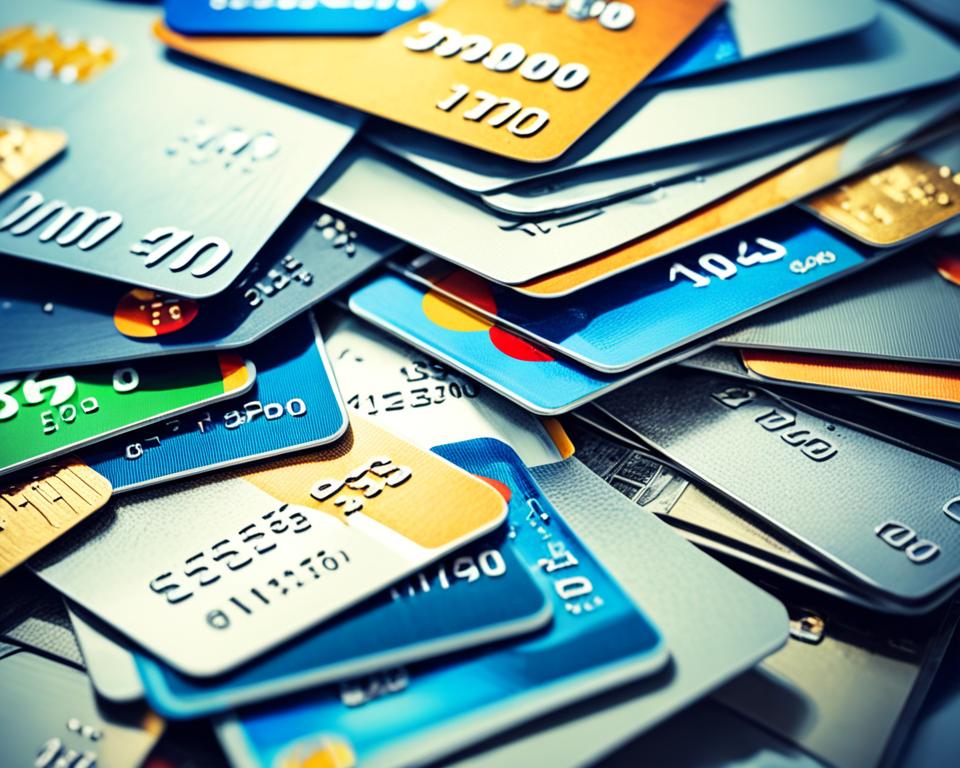
Conclusion
Understanding credit card APR and effectively managing credit card debt is crucial for maintaining healthy finances. By gaining a clear comprehension of how credit card interest works, individuals can take proactive steps to avoid falling into unnecessary debt traps.
One fundamental strategy for managing credit card debt is to pay off the balance in full every month. By doing so, you prevent the accumulation of excessive interest charges and maintain control over your financial future.
When using credit cards, it is essential to make informed decisions. Stay aware of interest rates and fees associated with your credit cards, as these can significantly impact your overall debt. Additionally, prioritizing the payment of outstanding balances will help prevent the accrual of additional interest charges.
By implementing these strategies and being conscientious about your credit card usage, you can achieve financial stability and avoid unnecessary debt burdens. Remember, understanding credit card APR and effectively managing your credit card debt puts you in control of your financial well-being.
FAQ
What is credit card interest?
Credit card interest is the fee charged by credit card companies for borrowing money. It is typically expressed as an annual percentage rate (APR) and can vary depending on factors such as the type of card and the borrower’s credit score.
How does credit card interest work?
If you carry a balance on your credit card, the card company will calculate and add interest to your outstanding balance each day. The daily interest rate is determined by dividing the card’s APR by the number of days in a year. This daily interest charge is then added to your balance, increasing the amount you owe.
What is a good interest rate for a credit card?
Credit card interest rates can vary widely depending on the credit card issuer and the borrower’s credit score. Generally, the better your credit score, the lower the interest rate you may qualify for. It’s important to shop around and compare credit card offers to find the best interest rate for your financial situation.
What are the different scenarios for repaying credit card debt?
There are two common scenarios to consider when repaying credit card debt: paying the minimum payment and paying more than the minimum. By paying only the minimum, it can take a longer time to pay off the debt and result in higher overall interest charges. On the other hand, paying more than the minimum can help reduce the time it takes to pay off the debt and lower the total interest paid.
Why should you pay your credit card balance in full each month?
Paying off your credit card balance in full each month can save you a significant amount of money in interest charges. When you pay off your balance, you are essentially avoiding the interest rate charged by the credit card company. This is like getting a guaranteed return on your investment and can free up more money for future investments.
How much interest is charged on a credit card?
The interest charged on a credit card can vary depending on the credit card issuer and the borrower’s credit score. As of June 2023, the average APR for credit cards was 23.74%. It’s important to note that credit card interest is calculated based on the outstanding balance on the card and can fluctuate depending on the daily interest rate and the length of the billing cycle.
How do you avoid paying interest on a credit card?
The only way to avoid paying interest on a credit card is to pay off your balance in full each month. By doing so, you eliminate the carryover balance to the next billing cycle and prevent the credit card company from charging interest on that amount. It’s important to manage your finances effectively and spend within your means to avoid building up debt.
Are you still charged interest on your credit card balance if you pay the minimum payment?
Yes, you are still charged interest on your credit card balance even if you pay the minimum payment. The minimum payment only ensures that your account is in good standing, but it does not prevent interest from accruing on the remaining balance. If you continue to carry a balance and only pay the minimum, the interest charges can add up quickly.
What is a purchase interest charge?
A purchase interest charge is the fee charged by a credit card issuer when you carry a balance on your card and don’t pay off your statement balance in full by the end of the billing cycle. It is calculated based on your card’s annual percentage rate (APR) and the total balance on the card. This interest charge applies to purchases made during the billing cycle.
When do credit cards charge interest?
Credit cards charge interest on any balances that are not paid by the due date each month. Interest accrues daily on the outstanding balance, based on the card’s daily periodic rate (DPR). The DPR is determined by dividing the card’s APR by 365. It’s important to understand the billing cycle and payment due dates to avoid unnecessary interest charges.
How do you calculate credit card interest?
Calculating credit card interest involves knowing your average daily balance, the number of days in the billing cycle, and your card’s APR. By multiplying the daily periodic rate (DPR) with the average daily balance and then multiplying that by the number of days in the billing cycle, you can determine the interest charged for that period. This calculation helps you understand the cost of carrying a balance on your credit card.
What is the bottom line when it comes to credit card interest?
Credit card interest can be a significant financial burden if not managed properly. Paying off your credit card balance in full each month is the best way to avoid high interest charges and keep your finances under control. By understanding how credit card interest works and taking proactive steps to manage your debt, you can stay on top of your finances and avoid unnecessary expenses.
How does credit card interest factor into managing credit card debt?
Understanding credit card interest is crucial for managing credit card debt. By paying more than the minimum payment and paying off your balance in full each month, you can minimize the amount of interest you pay and decrease the time it takes to pay off your debt. It’s important to be mindful of interest rates and fees associated with credit cards to effectively manage your debt and avoid unnecessary financial strain.
How does credit card interest affect your financial well-being?
Credit card interest can significantly impact your financial well-being if not managed properly. High interest rates and accumulated interest charges can make it difficult to pay off your credit card debt and can lead to financial stress. By understanding how credit card interest works and actively working towards paying off your balances, you can maintain control over your finances and improve your overall financial well-being.
Can credit card interest be negotiated or reduced?
It is possible to negotiate or reduce credit card interest rates in certain situations. If you have a good credit score, you may be able to call your credit card issuer and request a lower interest rate. Additionally, some credit card issuers offer promotional interest rates or balance transfer offers that can help reduce the amount of interest you pay. It’s always worth exploring your options and talking to your credit card issuer to see if any adjustments can be made to your interest rate.
How does credit card interest affect your credit score?
Credit card interest itself does not directly affect your credit score. However, if you consistently carry a high balance on your credit cards and accrue significant interest charges, it can impact your overall credit utilization ratio, which is a factor that can impact your credit score. It’s important to manage your credit card balances responsibly and pay off your balances in full to maintain a healthy credit score.

